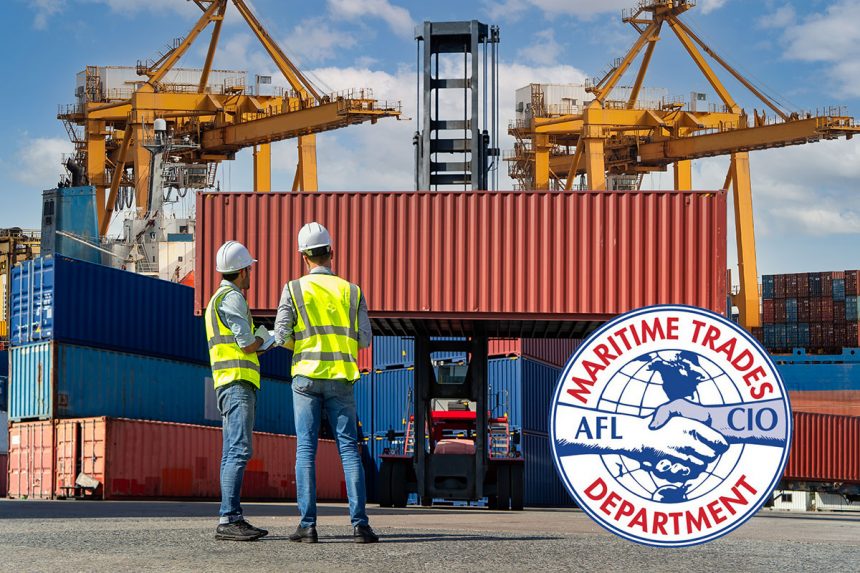Even though Matthew Cox and Donald Dame work in different sectors of the American maritime industry, they emphatically agree that the Jones Act is an indispensable contributor to U.S. national and economic security.
Cox is president and CEO of Matson Navigation, a union-contracted company that operates vessels both in the domestic and international trades. Dame is the vice president of human resources at General Dynamics NASSCO, a union shipyard that builds commercial and military vessels. Both men addressed the executive board of the Maritime Trades Department, AFL-CIO, during late February meetings near Orlando, Fla.
While the Jones Act is a common topic at MTD gatherings, it’s particularly timely now, as the nation’s freight cabotage law is under well-funded, deceptive attacks by parties whose only possible interest is sinking the U.S. Merchant Marine. The law mandates that goods moving from one domestic port to another be carried aboard ships that are crewed, built, owned and flagged American.
Cox stressed that the Jones Act must be maintained in its entirety, including the U.S.-build component. He said Matson “has put its money where its mouth is” in backing that requirement – they spent more than $500 million from 2002-2006 having vessels built at Aker Philadelphia Shipyard (also a union facility). And, Matson is finalizing plans to replace two older ships with ones built in America. (Overall, the company has 10 containerships and three roll-on/roll-off vessels in its Jones Act fleet, plus several barges. Matson employs mariners from several MTD affiliates.)
“This is an essential part of the Jones Act,” he told the board. “It provides employment for U.S. shipyards and provides capabilities – these skills that are important (in building commercial ships) are also important to the U.S. military.”
He said that although it’s more expensive to build in a U.S. yard, “these are assets that will last 30 years or more if properly maintained. If you take that cost and you amortize it over many years, it’s actually a very small component of our total operating costs.”
Cox added that another benefit of building at home is that it lessens the likelihood of the country having to depend on foreign nations to support the industry and to meet U.S. sealift needs.
He also mentioned a PricewaterhouseCoopers study that demonstrated the Jones Act’s hugely positive impact on America. The study showed the law helps sustain a half-million U.S. jobs and generates more than $100 billion in annual economic output along with $11 billion in annual taxes.
Cox said the nation simply can’t afford to outsource those jobs to foreigners.
Finally, he emphasized the importance of cooperative efforts from all segments of the industry. For example, Cox mentioned that during the past decade or so, maritime has lost many members of Congress who understood and supported the industry. Educating newer members is a vital task.
“Working together is essential,” he stated. “In the Maritime Trades, you’ve long understood the power of working together. It’s important for us on the commercial side to get the owners of various companies to work together with a single voice, to complement the voices of labor.”
Dame gave a riveting – and sobering – presentation demonstrating the undesirable parallels between U.S. and United Kingdom (UK) shipbuilding. He said that while it’s definitely not too late to revitalize the industry, we’re on a dangerous course.
Since 1953, the U.S. has lost more than 300 shipyards, both commercial and naval, Dame reported. The country now has around 100 yards; the UK, following a similar decline, has five.
“We can do something about it,” Dame stated.
The expected replacement of ships in the domestic trades “offers hope for U.S. shipbuilding. This requires a strong and intact Jones Act. A healthy Jones Act ensures preservation of our supplier base, our design and production workforces, and of course our seafarers. Amending the Jones Act would wipe out most U.S. commercial yards and shipping companies. Furthermore, it would limit U.S. Merchant Mariner employment to MSC (the Military Sealift Command).”
He stressed the importance of the entire industry actively supporting pro-Jones Act representatives at every level of government, and also called for developing a national transportation policy, led by the Department of Transportation, that includes adequately funding the Title XI loan guarantee program while streamlining the application process.
“The U.S. cannot expect to be a global power without the ability to build the breadth of naval ships it requires,” Dame added. “In time, this ability will be lost without commercial shipbuilding to share the costs and develop new technologies. Preserving both commercial and naval shipbuilding will require a shared, concentrated effort by government and industry and labor to develop a national policy that prioritizes shipbuilding.
“As the Brits have found,” he continued, “there is an inflection point in the industry where the ability to build certain ships no longer exists. I would argue that we are on the path to that point. While the fate of shipbuilding in the UK may already be written, it is not too late for the U.S.” (He mentioned that the UK recently turned to a foreign yard to build four ships for defense purposes, due to a lack of domestic resources.)
Dame wrapped up his talk with a quote from author and political scientist George Friedman: “The United States controls all of the oceans, and that control is not only the foundation of America’s security but also the foundation of its ability to shape international systems. Maintaining its control of the world’s oceans is the single most important goal for the United States geopolitically.”

